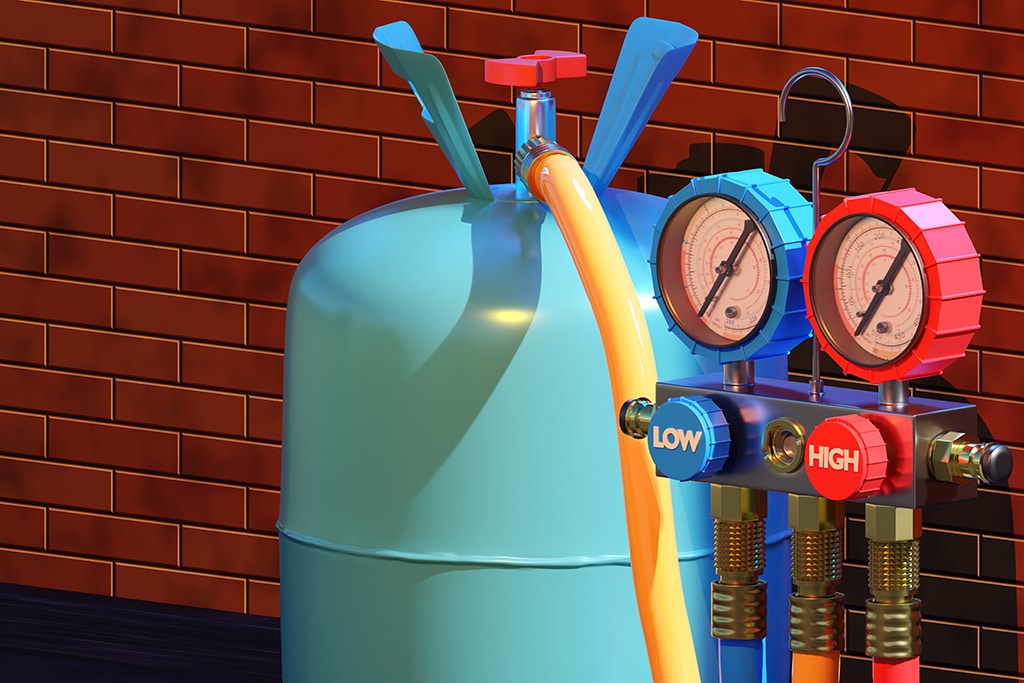
Your AC Repair Technician: Caution On Why You Shouldn’t Mix Refrigerants | Plano, TX
You might have heard that there is a phaseout of a specific refrigerant, maybe R22 or R-410A, and wondered, can I mix R-32 with R-410A? Or that your R-22 refrigerant is leaking, but the manufacturers don’t make it anymore and be like, I should mix the remaining refrigerant with R-32. The main question is, can you combine two refrigerants for your heating and air conditioning system? The straight and short answer is NO. You should never even entertain the thought because, for many reasons, this is illegal, impractical, and uneconomical for you as a homeowner.
CFC-type coolants such as R-22, common some years back in the US, are single-type coolants. CFC is an acronym for chlorofluorocarbons. These refrigerants comprise carbon, fluorine, and chlorine. Today, there are more advanced refrigerants called Hydrochlorofluorocarbons or HCFCs. These replacement refrigerants also have the three elements of CFCs but have an additional hydrogen atom. Hence, you should reach out to your trusted heating and AC repair technician to determine which refrigerant your HVAC system uses.
The replacement refrigerants work alright when operating in an isolated system that doesn’t contain contaminants or other refrigerants. However, this doesn’t mean they can be used to top off a system of R-22. They are intended to replace the coolant.
Phasing Out “Freon” or R-22 Refrigerants
Because R-22 has a devastating impact on the ozone layer, the importation and manufacturing of the coolant were limited in 2010. The EPA later imposed a total ban on Freon production and importation in 2020. If your unit uses freon, you might need help finding the coolant to recharge your leaking HVAC system. Today, only recycled, reclaimed, or recovered R-22 supplies are available. Hence, some homeowners have turned to having AC repair technicians replace their existing systems with ones that use allowed refrigerants such as R-32.
At this juncture, R-410A is also undergoing a phaseout. If your unit that uses R-22 is leaking, then it means that at some point, you will not find the refrigerant to recharge. The supply of R-22 will decrease, and the price will skyrocket. Fortunately, an AC repair technician can tell you when it is time to replace the unit based on its age if it is still using the banned refrigerant. Rather than struggle to look for refrigerant to top the unit off, replacing the unit with an eco-friendlier one might be prudent.
What Could Happen to Your HVAC System If You Mix the Refrigerant?
If you mix two refrigerants or more, the operating temperatures and pressures will change and worsen. The different refrigerants aren’t meant to be mixed. If the HVAC system is low on refrigerant, the AC repair technician should recharge it using the same refrigerant. The coolant charge should be optimized using the refrigerant’s pressure-temperature chart. Unfortunately, when mixing refrigerant with another, say R-32 with R-22, there isn’t any pressure-temperature chart you can refer to. Hence, optimizing the system charge is impossible, which increases the risk of overheating and shortens the lifespan and efficiency of the system.
Efficiency will be reduced. Since most R-22 coolants do not function efficiently as the mixed R-22, there could be an abrupt and severe drop in efficiency. Since your system will have to work more to cool your Plano, TX home, an inefficient AC unit could lead to increased energy expenditures. Your device might be harmed. This occurs due to unpredictable pressures and temperatures, as well as a possible lack of adequate oil return to the AC compressor, which could lead to the failure of your system, prompting you to call an AC repair technician.
Is Mixing Refrigerants Illegal?
Even if the EPA doesn’t show up at your door because you have mixed refrigerants, the ecosystem is already experiencing enough stress by using refrigerants in the purest form. We don’t need a dishonest AC repair technician combining refrigerants in our surroundings. Refrigerants can be recovered and used again if they aren’t mixed. If combined, the contractor can only pay extra money to send the contaminated refrigerant to a parts house. It is never reused since the parts house transfers it to a business that burns the refrigerant.
Why Would Technicians Mix Refrigerants?
The plain and simple answer is cost. A 30-pound jug of Freon can be about three or four times that of the replacement coolant. Suppose an AC repair technician in Plano, TX doesn’t care about their clients, the environment, or your HVAC system. In that case, they can recharge the refrigerant with another type and get it off before you notice any loss in the system capacity or damage to their HVAC system.
Other air conditioning service professionals are genuinely uninformed when they assert that new refrigerants can enhance a system’s performance. However, they overlook that a system shouldn’t be filled with replacement refrigerants before the original one has been completely recovered, evacuated, and replaced. This is particularly frequent when the temperatures are warm and cooling demand is at its highest. A contractor can cut corners and decide not to properly evacuate the system, inspect for leaks, make repairs, and then refill the equipment.
Are Replacement Refrigerants Bad?
No, they are not. However, they should be separate from other refrigerants. Before you or your AC repair technician choose a replacement refrigerant, they should determine the existing coolant. Additionally, they must ensure that the HVAC system is free of refrigerants and contaminants before recharging it with a replacement refrigerant.
Should You Use a Replacement Refrigerant?
As mentioned above, replacement coolants are not bad; they shouldn’t be mixed. Hence, ensure that when the AC repair technician comes to your home to recharge the refrigerant, they empty the existing one before replacing it. For a professional refrigerant recharge service at your Plano, TX home, contact us at One Hour Air Conditioning & Heating of Dallas today. We are your trusted AC professional.





